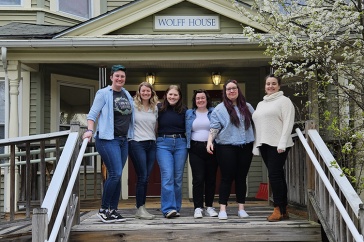
As someone who has worked for SHARPP for the past three years, a question I’ve gotten pretty frequently, to my surprise, has been: if someone is raped, assaulted, or experiencing abuse, why don’t they just go to the police?
Although there are a whole host of reasons, including but not exclusive to: people not recognizing that’s an option for them, people seeking support from loved ones instead of through legal avenues, and at times certain marginalized populations might not have trustworthy or safe relationships or experiences with police. One of the primary reasons that survivors don’t seek out the police in the aftermath of violence is that they don’t think they will be believed.
The criminal justice system is one that, unfortunately, often fails survivors of interpersonal violence. It wasn’t necessarily built with survivors in mind, and at times it isn’t trauma-informed. Going through the process can be re-traumatizing and invasive for survivors. Survivors have to tell the story of what happened to them multiple times: to police and investigators, to Sexual Assault Nurse Examiners, to lawyers and legal personnel, forensic examiners, and if their case is picked up, to the jury. Their case might even make it to the press. From the time a survivor steps into a police station, they could be getting themselves into a system that might not ever offer justice- but expect a significant amount of disclosures to strangers.
To explain these reasons to someone is one thing; it’s another thing to see a real example of someone who did everything right, and was still let down by the system that was supposed to be there to keep them safe. Netflix’s new series, Unbelievable, shows us what that looks like, in all of its horrible and unjust detail. Unlike any other crime show, Unbelievable focuses on the survivors and makes them characters just as much as the detectives; it shows a rape kit procedure, how time-consuming, invasive, and re-traumatizing they can be; and it shows the impacts that rape has on every aspect of a person’s life.
It’s a groundbreaking show, but it should come with a content warning: Unbelievable depicts scenes of rape and sexual assault, and may be re-traumatizing to some viewers.
The show is based on a true story (check out reporting on the case here by ProPublica and the Marshall Project), or rather, two different true stories. In one, an 18-year-old woman named Marie reports to the police that she was raped at knifepoint. We’re with Marie through her attack, when she repeats her story to multiple officers and detectives, when she completes the rape kit, and finally, when detectives tell her that they think she’s lying. They don’t believe her story, and pressure her into saying that she filed a false report, which leads to the loss of her friends, her job, and her living arrangements.
But in the other story, three years after Marie’s rape, two trauma-informed female detectives believe the survivors who report their crimes and pursue a serial rapist until he’s found and arrested. That rapist ends up being the same one who raped Marie years earlier. She finally gets justice, but only from those who took the time to believe the survivor and pursue an extremely difficult case with no shortage of dead ends and barriers.
In one story, a woman’s life is destroyed by a rape and the failings of the criminal justice system. In another, police treat rape as a crime as serious as any other. Unfortunately, the former is more common than the latter. It’s rare that survivors like Marie get redemption and validation.
According to data from RAINN, only 230 out of every 1,000 sexual assaults are reported to the police. Out of those 1,000 sexual assaults, 995 perpetrators will walk free. When asked in the same poll why survivors didn’t report their crime to police, 20% of respondents said that they feared retaliation, and another 13% said they believed police wouldn’t do anything to help.
Survivors deserve better from the system that is meant to protect them, and Unbelievable shows that more blatantly and honestly than any other television show to date.
-
Written By:
Jordyn Haime '20 | SHARPP Student Marketing and Communications Assistant














































